One Tuesday night in April, Mikaela Levons, head of development at Equal Justice USA (EJUSA), a criminal and racial justice nonprofit, had just wrapped up a phone call and was preparing to cook dinner for her kids when an email landed in her inbox.
It came from the Office of Justice Programs (OJP) at the Department of Justice, which, a few years earlier, had awarded EJUSA the first federal grants it had ever received—valued at more than $3 million. The money was intended to expand the organization’s work supporting community violence intervention efforts, which bring residents and victim service providers together to devise strategies for reducing community violence, often without involving police. The funds came as part of a massive influx of federal funding to support intervention in the years after the May 2020 murder of George Floyd by Minneapolis police.
Now, under the new Trump administration, the notice said EJUSA’s federal grants were no longer aligned with DOJ priorities. The funds were being immediately terminated, leaving the 40 staff and the programs that relied on the organization uncertain about the future. Levons and others were “shocked,” she told me. She and other EJUSA leaders had expected that the organization was unlikely to receive new funding, but, as Executive Director Jamila Hodge explained, “What nobody saw coming was that they would go back and seize money that Congress had already allocated.” In a statement following the cuts, Hodge said the administration “is not serious about protecting public safety,” but instead “committed to creating the conditions for violence to thrive.”
“What nobody saw coming was that they would go back and seize money that Congress had already allocated.”
EJUSA was one of more than 200 organizations supporting victims of violent crime that received similar notices that April evening. Attorney General Pam Bondi bragged about the mass cancellations of what she derided as “wasteful grants.” According to a report by the Council on Criminal Justice, a nonpartisan think tank, the affected grants were valued at about $500 million; approximately $169 million of that was for community violence intervention (CVI) programs.
The cuts proved to be fatal for EJUSA, a nearly 20-year-old organization with a long record of impact that included helping to end the death penalty in nearly a dozen states and securing millions of dollars in federal victims’ compensation funds for survivors of color. Within a few months of receiving the notice, its board of directors determined that it could not survive. Its last day of operations was August 15.
While EJUSA appears to be the only nonprofit working on CVI to cease operations entirely due to the DOJ cuts, representatives from nearly a dozen other nonprofits that also lost federal CVI funding told Mother Jones they have laid off staff and reduced programming as a result. Many fear these efforts by the Trump administration—which has prioritized a tough-on-crime approach heavily dependent on law enforcement—will both undo the progress they helped create and leave communities with fewer options for reducing crime. EJUSA’s former staffers also worry the federal cuts will lead other nonprofits with similar missions to meet the same fate theirs did. “I wish we were a unicorn,” Levons said, “but I do not think we are going to be.”
Hodge put it more bluntly: “We’re just the tip of the iceberg.”
Spokespeople for the DOJ and the White House did not respond to detailed questions from Mother Jones for this story.
CVI is the newest iteration of decades-old efforts to help communities bolster public safety without primarily relying on police.
Approaches look different based on the needs of various areas. Some might require violence interrupters who were once engaged in violent acts but now mediate conflicts on the street. In others, partnerships are created between medical staff and local advocates to offer victims who may have been hospitalized long-term support before they leave hospitals to reduce the risk of retaliatory violence. In some communities, local leaders and social service providers connect to identify those most at risk of perpetrating violence and to offer them resources as a form of deterrence.
Evidence proves their effectiveness: A 2022 study published in the journal Urban Science found that a Sacramento-based CVI program led to a nearly 30 percent reduction in gun violence in a neighborhood where outreach workers were deployed. And a 2017 study published by researchers at the John Jay College of Criminal Justice found that a CVI program in New York City reduced shooting victimizations by more than 60 percent in the South Bronx.
“I think the value of CVI is in its core principles of trust and integrity and relationship-building,” said Jordan Costa, associate director of the Giffords Center for Violence Intervention at the gun violence prevention nonprofit founded by former Democratic Rep. Gabby Giffords. “A lot of the people who do this work come from the same neighborhoods where violence happens,” which provides the kind of credibility that “allows them to step into moments where other public safety actors or systems might not,” Costa added.
“I think the value of CVI is in its core principles of trust and integrity and relationship-building.”
Nearly a decade ago, EJUSA trained its focus on supporting a CVI program that was already underway in Newark, New Jersey, a city where police had long held a troubled relationship with its mostly Black residents. EJUSA tried to improve that relationship by facilitating conversations between police and community members, including CVI practitioners, through Trauma to Trust, which EJUSA launched in 2016. That was the same year that the city and DOJ announced a court-ordered agreement to reform racist policing practices and increase oversight of officers. (Last month, a federal judge announced she was prepared to release the city from federal oversight, declaring “that progress has been made.”)
Over two days of workshops facilitated by EJUSA staff, the program saw law enforcement and members of the community transition from what Emanuel Miranda, Newark’s public safety director, described as “an ‘us-versus-them’” attitude to one of mutual trust. Members of the local CVI group, Newark Community Street Team (NCST), attended. They mentor young people at risk of violence, mediate conflicts that unfold on the streets, and provide resources to deter people from crime and to those victimized by it. Participating in Trauma to Trust, former NCST deputy director Elizabeth Ruebman said, “changed our understanding of trauma,” and helped them understand how it “affected so many people and also could lead to violence and to bad policing.” Rey Chavis, executive director of NCST, said participating in the training also helped NCST violence interruptors “take the chip off their shoulder” and better understand the trauma police officers faced in their own day-to-day work. “It was an enlightening moment,” he added.
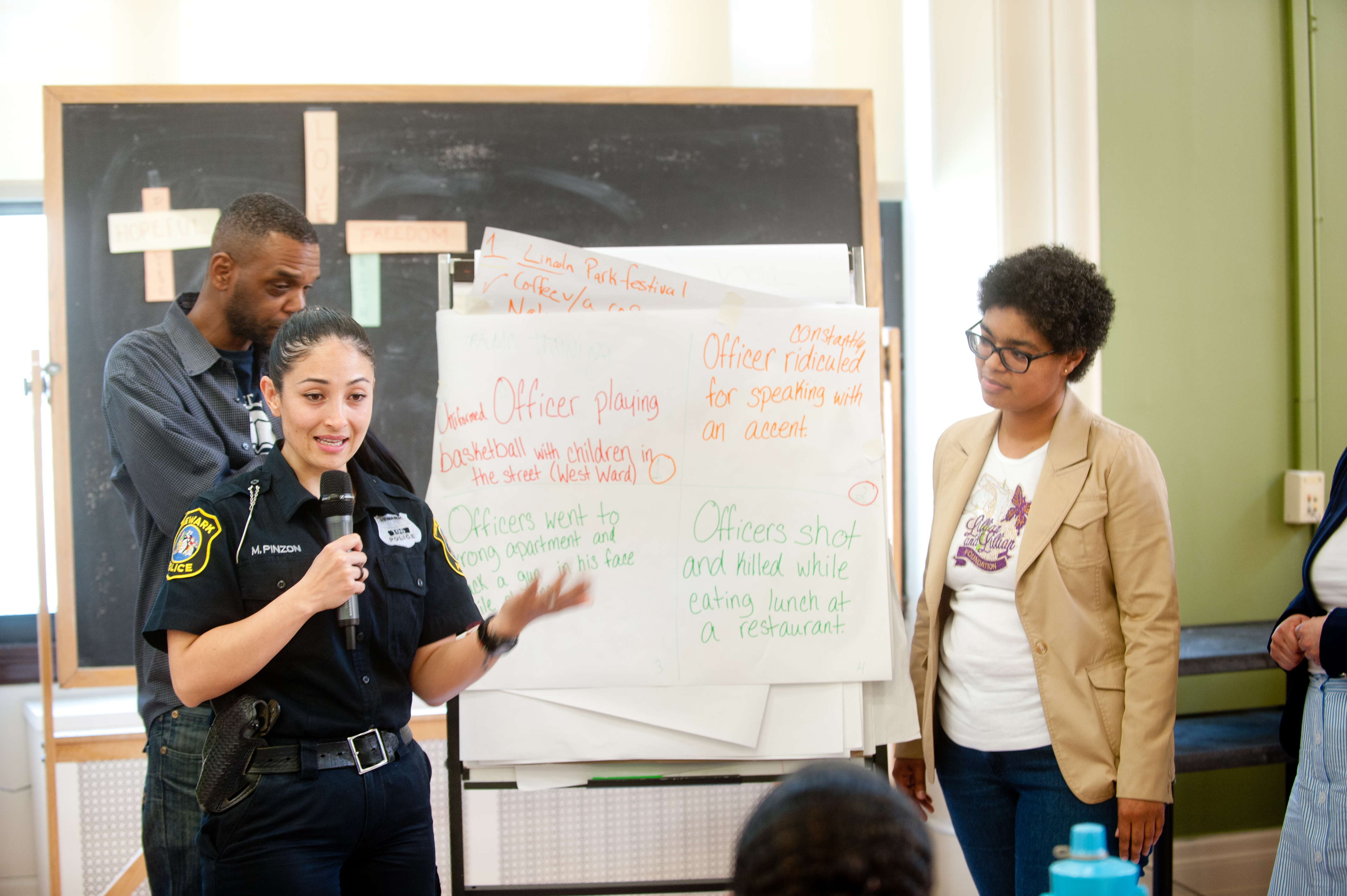
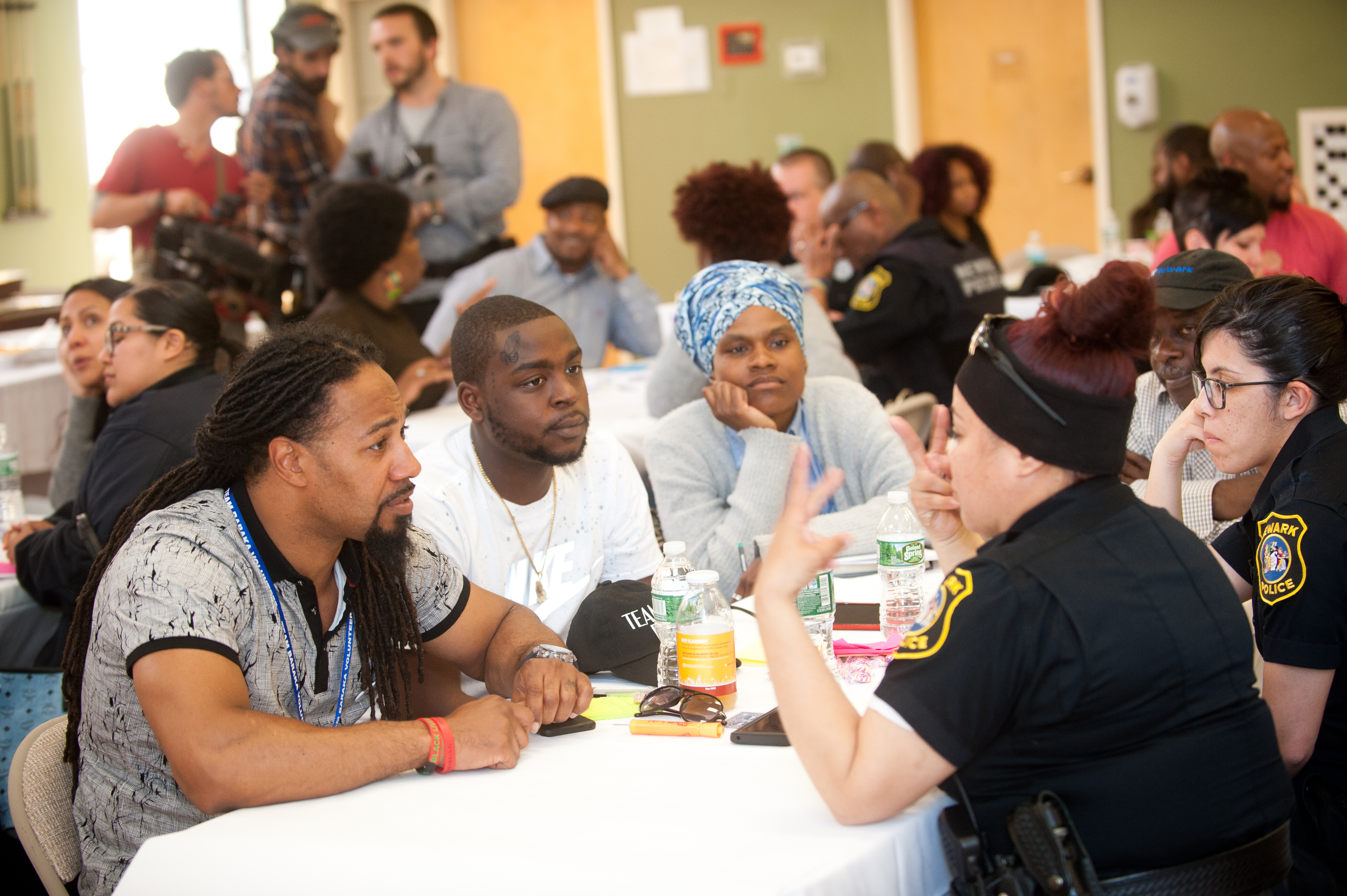
In his State of the City address in October 2020, Democratic Mayor Ras Baraka credited the work of EJUSA, NCST, and others with helping to reduce homicides and other crimes. In a statement provided to Mother Jones, Baraka called EJUSA “an extraordinary partner to the City of Newark, helping us advance public safety through healing, trust, and collaboration.” In 2022, Trauma to Trust expanded to Baton Rouge, Louisiana, and trained more than 1,000 police officers and community members between the two cities.
EJUSA also helped grassroots CVI organizations secure much-needed cash. Its staff, for example, was part of a New Jersey coalition that successfully lobbied the state legislature for the passage of a bill to create a violence intervention program that was later funded with an initial infusion of $10 million. EJUSA did similar work in California, where it helped successfully advocate for $200 million for CVI in 2021—the largest-ever state investment. These groups got another boost when, in 2022, former President Joe Biden’s DOJ began formally funding CVI for the first time. Support came from a $50 million congressional appropriation and $250 million allocated by the bipartisan Safer Communities Act, passed that same year. “This was a massive infusion of resources to organizations that have been operating on a shoestring,” Amy Solomon, former assistant attorney general of the OJP, the DOJ office that administered the funds, told me. Following Floyd’s murder in 2020, “there were both tensions and momentum to actually invest in communities that are much closer to the problems and the solutions,” Solomon added.
More than $3 million of the new DOJ funding was earmarked for EJUSA, which passed most of that money on to help five grassroots groups in Louisiana expand their CVI work. A smaller grant was supposed to support the launch of restorative justice programs—another form of CVI that brings victims and perpetrators together to facilitate healing after harm—across the country. This work, Hodge explained, was focused on finding “better solutions that are rooted in community, that are driven by those who are closest to the problems, who actually know what they need to be safe,” as opposed to punishments delivered “through a racist punishment framework that is violent.” In this way, the work was a continuation of EJUSA’s early work in addressing what Hodge called “the most extreme example” of this punishment system: the death penalty.
EJUSA’s work began in 1990, as part of the Quixote Center, a Maryland-based Catholic social justice nonprofit. Founded in the late 1970s, that organization’s mission had been mostly focused on alleviating poverty in Nicaragua and advocating for democracy in Haiti. EJUSA was charged with tackling human rights issues—specifically, mass incarceration and the death penalty—in America.
Support for the death penalty was part of the tough-on-crime push popular in the 1980s and early ’90s. By 1994, 80 percent of Americans who were surveyed said they were in favor—an all-time high, according to Gallup polling. EJUSA focused on public education and advocacy, becoming one of several leading national organizations fighting capital punishment and wrongful convictions. They included Bryan Stevenson’s similarly named, but separate, Equal Justice Initiative, the Innocence Project, and the American Civil Liberties Union. EJUSA focused on trying to shift public and political opinion through community education on the dangers and inequities inherent in capital punishment. They showed how it disproportionately targeted the Black and Latino population and sometimes led to the executions of innocent people. They also tried to puncture the myth that the death penalty was the best way to provide “closure” for the families of victims. “They think, ‘Okay, now I’m going to move on with my life,’ and then they get stuck in an appeals process for years, and they just get retraumatized over and over and over again,” EJUSA’s founder, Shari Silberstein, explained to me when we met at a Brooklyn coffee shop in October.

By the late 1990s, the national tide began to turn on the death penalty. In 1997, the American Bar Association called for a moratorium on the practice and demanded that jurisdictions implement policies to ensure punishment was handed down “fairly and impartially” with attention to minimizing the risk of wrongful convictions. Illinois became the first state to implement a moratorium on the death penalty in 2000; Maryland followed in 2002. In 2004, Silberstein teamed up with David Kaczynski, founder of New Yorkers Against the Death Penalty, to try to stop the legislature from restoring it after the state appeals court ruled capital punishment unconstitutional—a decision Republicans pledged to undo through legislation. Silberstein teamed up with Kaczynski—who also happens to be the brother of Ted Kaczynski, the so-called Unabomber, who killed three and injured nearly two dozen people over about two decades—to lobby lawmakers and advocate against it. In the spring of 2005, the legislature rejected efforts to restore the death penalty, making New York the first state in the modern era to dismantle it completely. That was the moment, Silberstein recalled, that put EJUSA on the map. “Lots of different state coalitions were asking, ‘How can we get you in our state?’ And a lot of funders were saying, ‘How can we get you in more states?’”
Buoyed by its success, EJUSA launched a nationwide campaign that, over the next five years, helped more than 60 local governments adopt anti-death penalty resolutions. In 2008, Silberstein made EJUSA a standalone organization dedicated to ending the death penalty in states and jurisdictions across the country. In those early years, with a budget of just over $700,000, the organization relied mostly on individual donors and some small Catholic funders. By 2019, it had a budget of about $2.7 million and was supported by a mix of individual donors and large foundations, including the Fund for Nonviolence, Open Society Foundations, and the Silicon Valley Community Foundation, according to Silberstein and its 990 forms.
EJUSA’s staff and influence grew from five full-time employees in 2008 to nearly 50 in January 2025. Over nearly two decades, the organization helped to end capital punishment in 11 states, according to Silberstein. Broadening its mission, it rallied conservatives and evangelical Christians who opposed the death penalty by hiring staff from those communities to do outreach and lobby lawmakers. Eventually, it expanded into supporting local organizations doing CVI, which led to the DOJ grants. Those awards, Solomon said, were a testament to the fact that EJUSA “was doing some very special, important, unique work.”
Nobody anticipated how abruptly it would end.
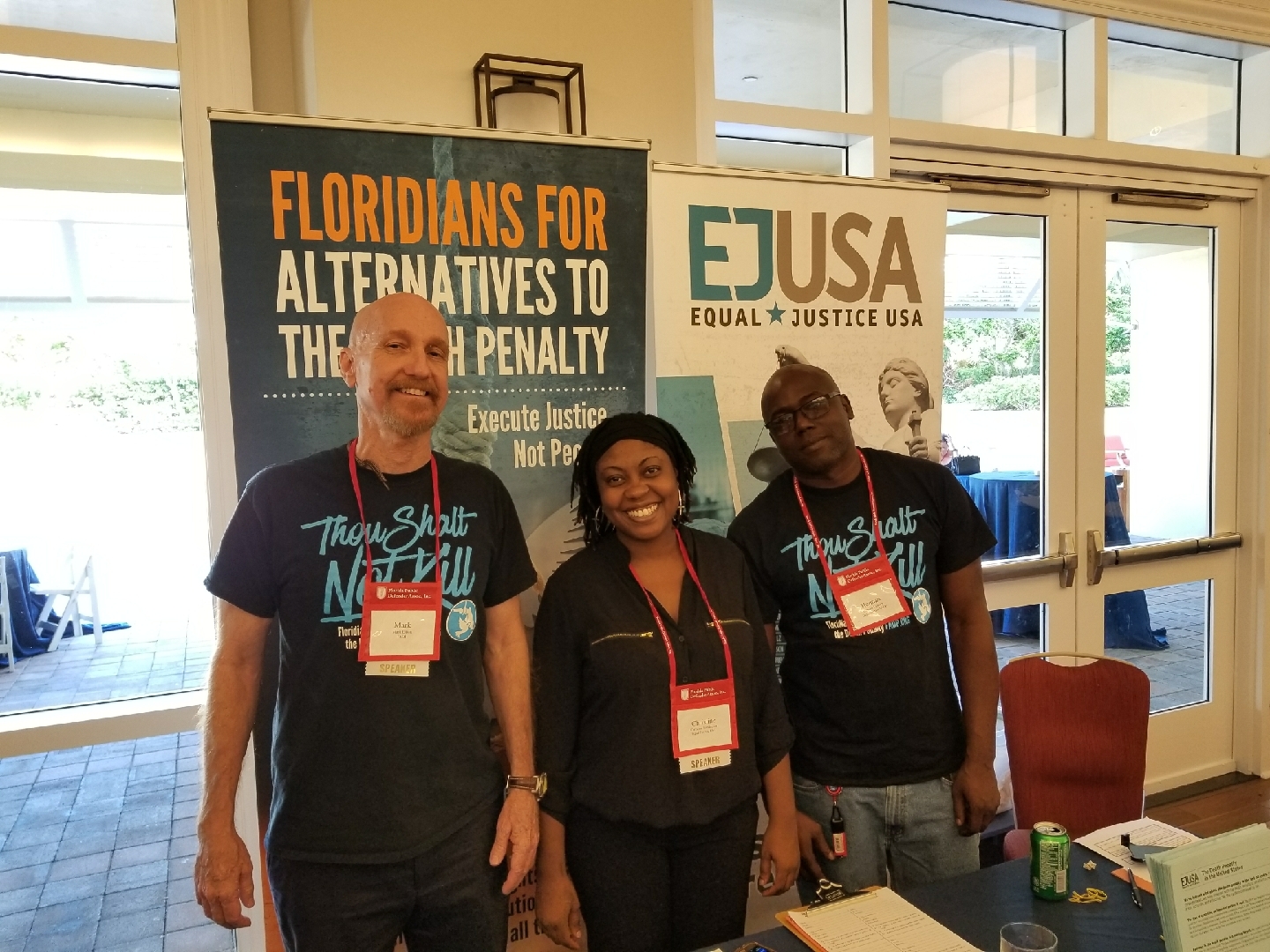
The April cuts to EJUSA and other anti-violence nonprofits prompted a national outcry.
More than 40 Democratic lawmakers in Congress wrote to Trump urging him to reinstate the funds, which they said “directly contribute to making communities safer.” In May, five of the organizations that were affected filed a class action lawsuit against the DOJ, alleging the cuts were unlawful. A federal judge granted the Trump administration’s request to dismiss the case. (The plaintiffs, which do not include EJUSA, are appealing that ruling.)
The reverberations were also immediately felt by the smaller organizations that partnered with EJUSA. Through its federal grant to support CVI in Louisiana, EJUSA was working with Beyond Harm, which works to respond to domestic and sexual violence in New Orleans. Co-founder Amanda Tonkovich had recently hired a new full-time staffer to help expand individual counseling and start new groups for women and LGBTQ perpetrators of violence when she got word of the funding cancellation. “We were finally off the ground, we were expanding, and then to have that cut was obviously really, really devastating,” she said. The new employee soon was reduced to part-time work, Tonkovich said, and the programs for women and LGBTQ perpetrators have yet to get off the ground.
“We were finally off the ground, we were expanding, and then to have that cut was obviously really, really devastating.”
If those groups had launched, Tonkovich said, they would have doubled the number of people Beyond Harm directly served, from about 30 to 40 people at a time to 50 or 60—plus many others who would benefit. “When we help one person to become non-abusive,” Tonkovich said, “there’s a huge ripple effect.”
In Oakland, Michigan, staff at the social justice nonprofit Oakland Forward had been preparing to launch a restorative justice program that EJUSA helped them build with their other federal grant. “Our team was so ready to go,” said Autumn Butler, co–executive director of the organization, which works to support local communities of color. Because of EJUSA, she added, “We had the training, we had the relationships.” With EJUSA’s guidance, Butler’s staff had worked with local prosecutors to craft a restorative justice program they hoped could divert nonviolent juvenile offenders from the prison system by offering them an opportunity to address the harm they had caused. Staff would also determine what support the kids needed to reduce their risk of re-offending.
But when news of the DOJ cuts came, they had to abandon those plans. “By now,” Butler said when we spoke in early September, “we would have been working on our first case.”
Even before the grant cancellations, EJUSA was in a financially perilous situation. The organization was facing a $1.4 million deficit at the end of fiscal year 2023, which former staffers attributed to the fact that the influx of private funding to racial and criminal justice organizations after the protests of 2020 had dried up. “Anything that relies so much on the control of wealthy people who often are very distant from the issues that we’re addressing,” Hodge said, “has never had the firmest foundation.”
A month before the grant cancellations, EJUSA announced the close of both Trauma to Trust and its anti-death penalty program, due to what Hodge later described as “the increasingly daunting funding landscape.” When they got word of the DOJ cancellations, EJUSA leaders began discussing the organization’s future. By the summer, with the board of directors, they made a difficult decision. They couldn’t survive the federal cuts without laying off most of their staff, so they would cease operations by mid-August. Doing so would allow them to pay staff severance and give some of their reserves to the smaller organizations they had worked with, like Beyond Harm.
The impact of EJUSA’s disappearance extends to former staffers, who credited EJUSA with reshaping their understandings of safety and justice. “It opened up my imagination for what’s possible,” Levons said of working there. “I probably came into the work thinking that safety is created by either putting away bad people or increasing security or police.” But she now realized that there was “a third, transformative way, by actually building safety into communities and helping community members to create that safety.” People outside the organization are also feeling the loss. Without EJUSA, “there’s gonna be a void,” said Chavis of NCST, the CVI group in Newark, “and we’re gonna have to figure out how we can fill it.”
Chavis is also dealing with his group’s own financial stressors. NCST is one of the 60 other nonprofits working on CVI that, like EJUSA, also lost its DOJ funding. (According to the CCJ analysis, there are more than 20 additional nonprofits that received DOJ funding for CVI via larger nonprofits, bringing the total number of affected nonprofits to more than 80.)
Unlike EJUSA, many of these groups survived, but with painful cuts. NCST had to lay off 15 staff members and ended the programs that their $3 million grants supported, which employed violence interrupters to deter high-risk people, including some youth, from violence, Chavis said. Puerto Rico’s only federally funded CVI program, run by the nonprofit Taller Salud, also had to lay off or reduce hours for a dozen staffers and cut programming, according to executive director Tania Rosario Mendez. Representatives for nonprofits in cities as varied as Miami, New York City, and Oakland, California, also told me they had to cut staff and CVI programs after losing DOJ grants. Those who will be harmed as a result of these cuts, according to Chavis, are Black and Brown people. “I feel like we’ve taken some strides forward within the last decade,” he said, “and I feel like this administration is taking a step to roll things back.”
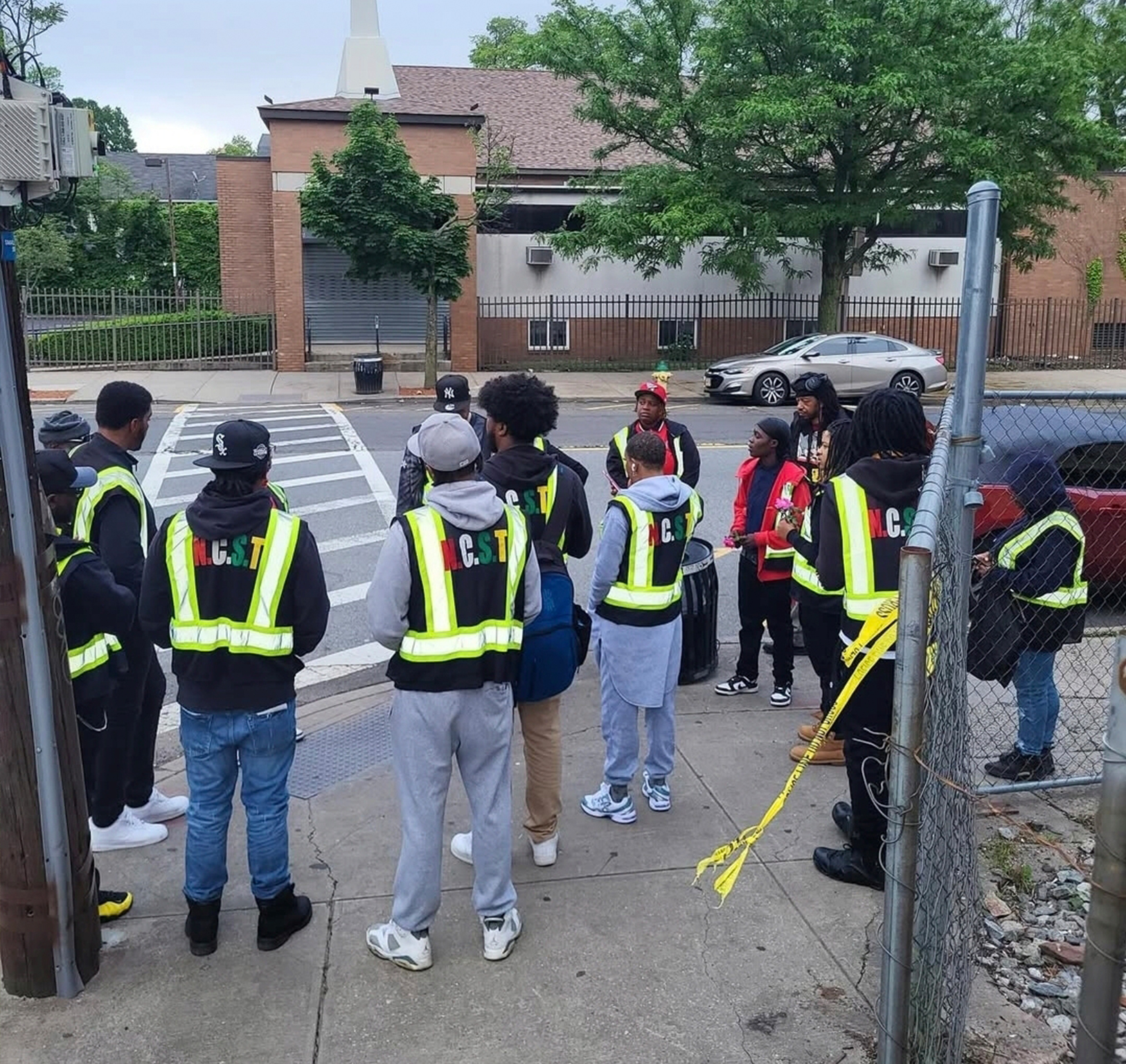
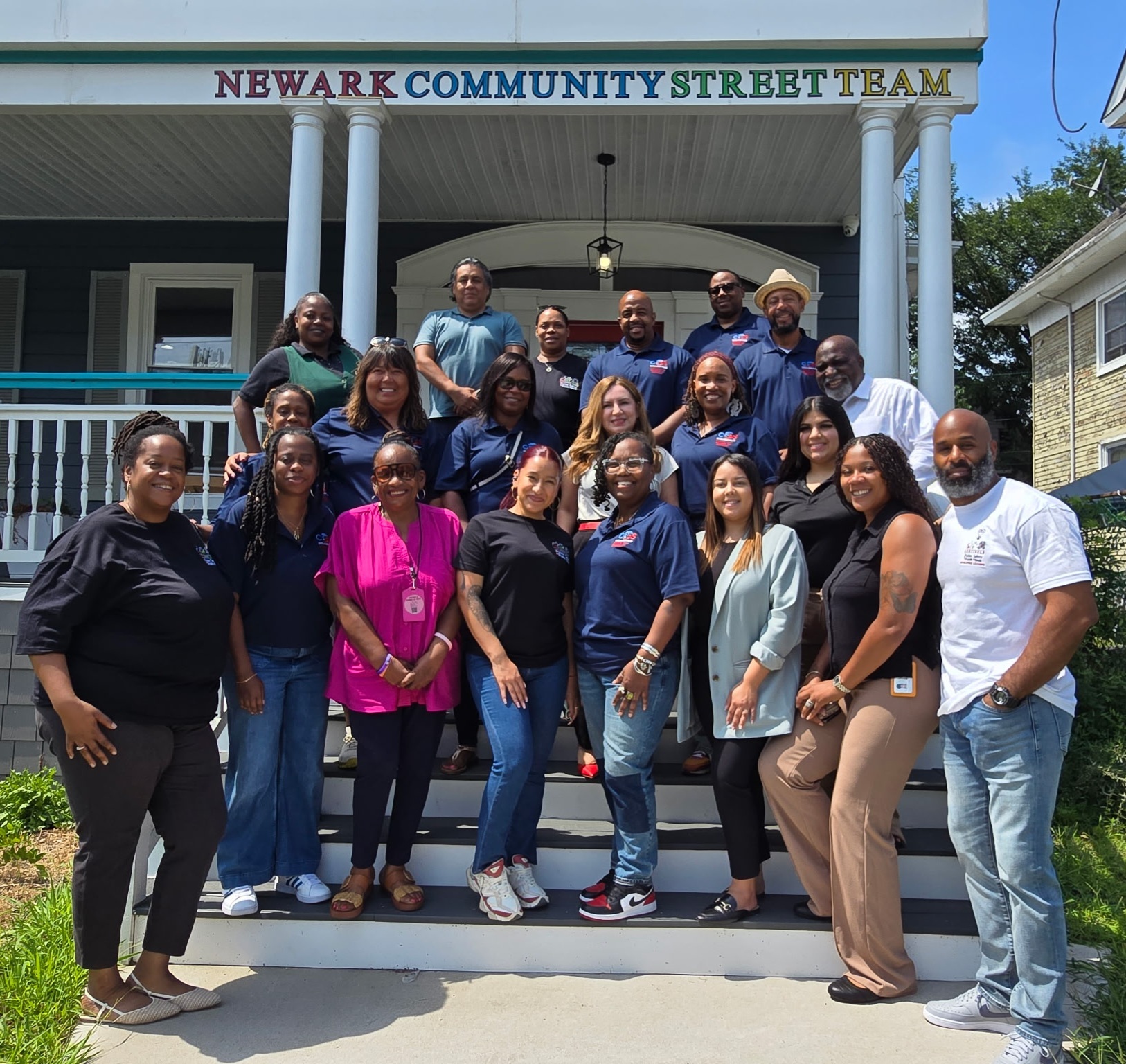
Chavis is correct: The DOJ has said that, going forward, it will only award CVI funds to local governments, not to nonprofits—which, as Solomon noted, “play a unique and essential role in driving the work on the ground.” The DOJ’s proposed budget for the next fiscal year also suggests slashing the $50 million appropriation for CVI. Beyond changes to DOJ funding, the Trump administration has also made several other moves that would undo progress made by EJUSA and similar organizations. On his first day back in office, Trump signed an executive order restoring the death penalty for certain federal cases, reversing the moratorium imposed by Biden’s DOJ. As far as crime prevention goes, Trump has deployed the National Guard to cities nationwide and promoted aggressive policing practices.
Despite all this, the work of empowering people to build public safety in their own communities will endure, Hodge and others insisted. “The work will absolutely continue, because the work was being done well before any federal government dollars were invested,” Hodge told me. “Black and other marginalized communities have been keeping themselves safe for generations.”



























